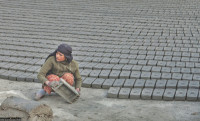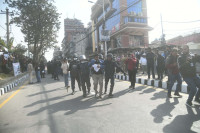Opinion
Filling a vacuum
After 26 years of democracy, Nepal looks set to have a comprehensive national security strategy
Narendra Rawal
The national security policy of any country is an executive assertion which must seek to guarantee that its beliefs, values and unity are protected and that government institutions are made to function for the welfare of the people. What we expect from our national security policy (NSP) is that our basic needs, civic freedoms, liberty, property and participation in the productive life of society are assured, and that we are not intimidated by any force, internal or external.
It is a matter of great joy to learn that our national security policy will come into effect soon after the Cabinet approves the draft paper tabled by the National Security Council. The draft NSP is a comprehensive policy encompassing all security issues ranging from food, health and natural resources to the protection of the sovereignty and the safeguarding of the territorial integrity of the country.
This will give impetus to the formation of a grand national security strategy. A strategy of such a nature will ultimately integrate all the elements and all the major instruments of national power to achieve the desired national goals.
Long-pending document
The quality of the NSP is yet to be assessed. The government has finally decided to publish the document 26 years after Nepal became a democratic nation. Before 1990, the Panchayat regime used to include some aspects of the security policy in the form of Mulniti or principal policies. However, the provisions would not be as comprehensive as we expect them to be today. The Mulniti would talk briefly about modernising the then Royal Nepal Army with respect to traditional security threats. Despite the efforts of a number of administrations after 2006, the NSP did not happen. This was due to frequent changes in government or failure to realise that the security policy is a significant responsibility.
The NSP not only integrates national development efforts but also brings the ministries and their line agencies to a closer acceptance and understanding of each other. The purpose of the security policy is to identify strategic priorities and establish a balance in the allocation of resources for development programmes and national defence. The formulation of the NSP involves a very fundamental and comprehensive framework consisting of interrelated issues and concerns that may impinge on national security. The security policy will thus help to make the correct decisions about the prioritisation of national programmes.
The NSP is a framework which defines a state’s objectives, often in the form of a consolidated document. This means a single policy may have several objectives designed to be achieved through different instruments of state power. The quality of a comprehensive security policy can, therefore, be judged from the choice of means selected to achieve the defined policy objectives. In a country like Nepal with severe resource constraints, strategists must strike a balance between the selection of objectives and the allocation of state instruments to resolve challenges or threats.
Good move
The Defence Ministry and its military organ have been doing their job without any defined security or defence policy. It is obviously due to the professional wisdom earned through age-old traditions and institutional experience that the Nepal Army has been successful in accomplishing its roles and responsibilities. There is an obvious policy vacuum. However, the Army has tacitly adopted defence policies to write up its official ‘military doctrine’ so that it can guide its own affairs whether in peace or conflict situations.
The constitution has stipulated certain basic functions, but they are not sufficient for the structural or institutional growth of the Army. Neither has the Defence Ministry formulated its own official strategy nor has any defence doctrine been prepared (in the absence of the NSP) to direct the Army on how to accomplish its future missions. The government’s policies and programmes statement does not provide an inclusive rationale for the Army as part of a comprehensive national
security framework. The Army has always sought to move forward and conduct its business as an inclusive member of the complete system.
These are some of the reasons that prompted the incumbent defence minister to prepare a viable security policy. His determination to produce a complete and consolidated document for the first time must be appreciated. The NSP has come at a time when the security challenges are indeed complex. We realise that these challenges and concerns are intertwined locally and regionally, and that they are interconnected with risks and opportunities. We believe that the security policy, which has been formulated with the widest consultation and collaboration among various stakeholders, professionals and national security practitioners, will definitely fulfil the goals of this undertaking.
We expect the upcoming security policy to focus on good governance, delivery of basic services, economic and infrastructural reconstruction, sustainable development, unity among the people, security of migrant workers and regulation of entry and exit points along international borders besides correcting the management of the restructuring of the security sector. What we must understand is that a trend has been set in a democratic federal system. However, as the NSP is not a fixed document, periodical reviews based on our skills, experience and appropriate methodology will help us put it in a much better perspective accordingly.
Rawal is a retired Nepal Army Major General and holds an MSC in strategic studies from the National Defence University, Islamabad, Pakistan




 7.12°C Kathmandu
7.12°C Kathmandu










